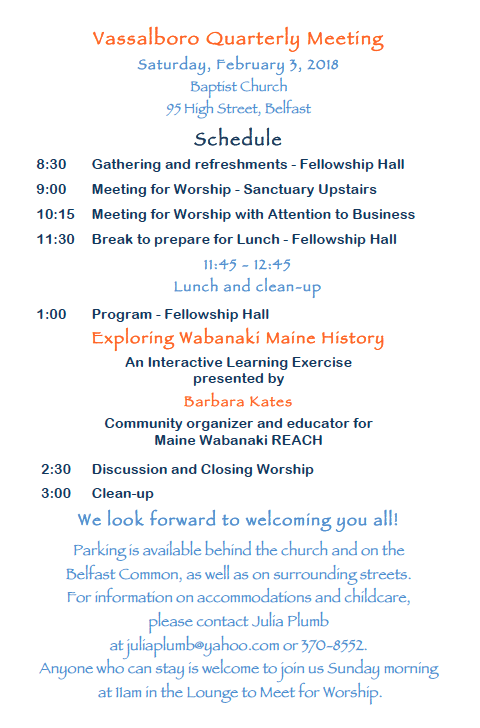By Linda Muller
I am glad to recognize the continuing debt we owe to the original people of our area; Casco Bay and beyond.
I am relieved not to recognize C. Columbus, who practiced severe genocide and never stepped foot on North or South America.
I am aware that Norsemen and fishermen had traded with people in our area prior to 1492. They did not invade in the 1400s but for the most part, visited and let the indigenous people be.
After I was alerted through Peace and Social Concerns Committee, I attended a workshop by Ralph Greene, publicized by New England Yearly Meeting, held at Vassalboro Meeting. He interpreted multiple bible passages and incidents from Quaker history to develop his conception of “ the lamb’s war”. To condense these 2 hours, I’ll share that this is in reference to speaking truth to power and being faithful to leadings even if risk or danger of violence or possible sacrifice is involved. Ralph lectured that Papanuhang was a man of the Mohegan people, whose tribe was decimated by settlers with rigid ideas (such as Puritans) and US government policies regarding “the Indian problem”. Despite this, he was part of a small group that left their Connecticut homeland and went to live with a related tribe in the Delaware region, the Lenape people. This was a move to survive. He was able to establish a peaceful cooperative settlement for several years and negotiated prisoner of war releases and avoidance of bloodshed on occasion. Ralph had a distant relative from the Mohegan people.
This achievement by Papanuhang is remarkable and speaks to this indigenous man’s spiritual strength, as he was already battling alcoholism and in contact with others who were too.
I attended a film and discussion sponsored by Wabanaki Reach, at the UUC in Brunswick. There are several of these groups in Maine and several local Quakers are involved. These groups are an attempt by native Maine people (collectively referring to themselves as Wabanaki) to educate all of us “ from away” or not native… another term is settlers. This was a film about the Dann sisters, two elderly women living a traditional ranching life on land they were deeded and open range ranching on land of their tribe, the Western Shoshone people. They were put out of business by annulment of the tribe’s treaty rights by, “ gradual encroachment”, sad but true. Their niece was present to be part of the discussion that followed. I saw the images of multiple open pit mines on their land and the taking of their horses and cattle, which ensued, to represent the very worst of our present culture, greed got the upper hand and the suffering was monstrous .
I am told by native Mainers (Wabanaki) that they want those of us who are not native to educate ourselves about all that has happened as our ancestors and as present-day non-native people interact with the remaining native population.
There is much to reflect on as our governor has signed an interpretation of the Maine land claim of the 1980’s, stating the Penobscot tribe has no right to monitor and protect the health and safety of the Penobscot River. This is working its way through the courts. Will the outcome be fair, will it be in the best interest of all the people of Maine? Will it uphold the treaties? Will it help to protect the quality of water in one of the major rivers here in Maine? I understand that the Penobscot people consider this river to be the lifeblood of their tribe. Much to learn, to contemplate, to discuss and act on.

